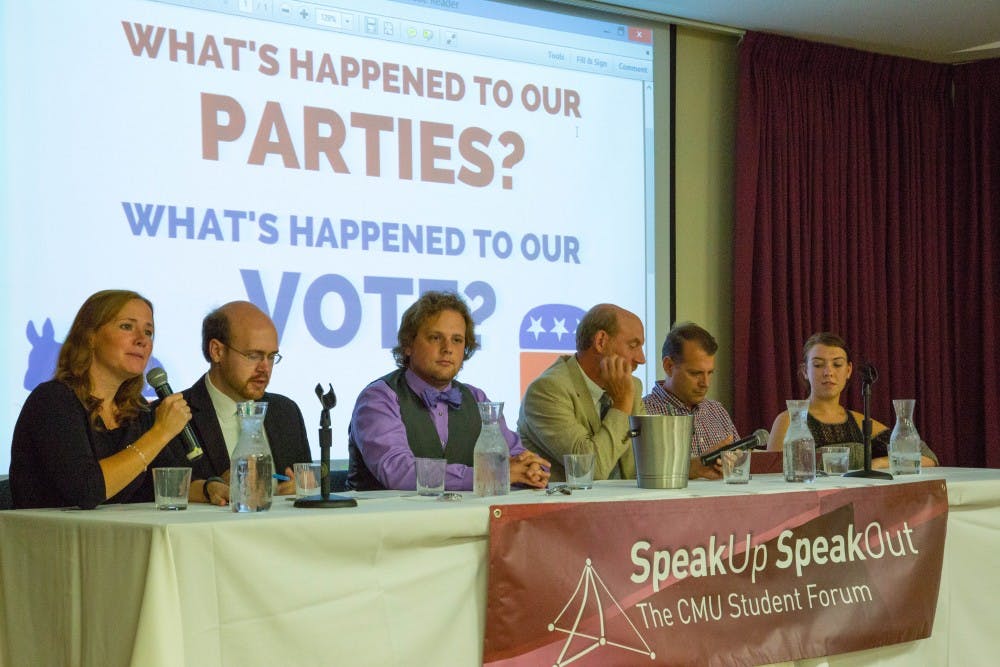Third party voting, polarization of political parties discussed at Speak Up, Speak Out

Speak Up Speak Out hosted their first open forum Sept. 21 that centered around third party voting and the polarization of political parties in the Bovee University Center Auditorium.
Students had the opportunity to discuss election topics at an open forum hosted by Speak Up, Speak Out Wednesday in the Bovee University Center Auditorium.
Third-party candidates, the media’s role in elections and polarization in politics were the main talking points during the forum.
Economics professor Sam Raisanen led the discussion by asking the six-member panel and students in attendance to share personal views on election topics.
Members of the panel included:
- Student Green Party Representative Chris Bonnen
- Political Science Professor Jeremiah Castle
- Young Americans for Liberty President Victoria Dennis
- Journalism Professor Ed Simpson
- Political Science Professor Kyla Stepp
- Economics Professor Jason Taylor
Voting for a third party candidate
The first question from the audience Raisanen asked panelists was whether or not they think voting for a third party candidate is equivalent to “throwing your vote away.”
“Some of those on the left say voting for a third party might as well be voting for Trump, some of those on the right say you might as well be voting for Hillary,” Raisanen said.
Economics Professor Jason Taylor brought up the 1992 presidential election when Ross Perot took 19 percent of the popular vote before dropping out. He mentioned Perot was winning in the polls at one point of the campaigns.
“That was at a time when the sitting president, George H.W. Bush and the democratic candidate, Bill Clinton was not unpopular,” Taylor said. “Despite that, Perot could have won that election, so don’t tell me that Gary Johnson can’t win.”
Stepp agreed, but said the chances of Johnson winning the election are unlikely.
“If we’re answering the question are you throwing away your vote, I think the answer is yes,” Stepp said. “The Electoral College is set up for two parties. I’m not saying that’s good or bad, but it is what it is.”
Whether or not voting for a third party is the same as throwing a vote away comes down to the reason you’re voting, Political Science professor Jeremiah Castle said, to wrap up the discussion.
“If you truly believe in your heart of hearts that the Libertarian party is the only moral party in the party system, then maybe it’s worth thinking about voting your morals," Castle said.
Social media’s role in the election
While some students said social media has been a positive outlet for campaigns to reach more followers, political science student Jeremy Rodgers said the most affective way to reach voters is person-to-person contact.
“Very few of us have actually had their mind changed on a policy issue in a debate on Facebook or twitter,” Rodgers said.
Having attended two rallies for Trump and Bernie Sanders, Freshman Quinn Kirby said the candidates seem “more extreme” in their beliefs online than in person.
“Trump seems to be a lot more vocal about his bigotry on Twitter because it’s a safe space and he won’t get as many protestors to effect him loudly on the internet, he can just shove them aside," Kirby said.
Polarization in Politics
Castle introduced the topic of polarization in the political parties. He said one of the jobs a candidate has after being elected president is “putting the country back together.”
Because the parties are so polarized, there will always be a decent amount of people unhappy with the election results, Castle said.
Taylor said he believes the candidates, Trump and Clinton, are more polarized than the voters.
“A lot of people I talk to aren’t happy with either of these candidates,” he said. “I’d like to think that Americans aren’t as polarized as they seem to be.”
Senior Bradley Wojcik said debates over which candidate will be president won’t resolve the issues people hope to see resolved when deciding which candidate to vote for.
“I think we’re better off if we get to a place where it doesn’t really matter who’s in the White House because our system actually works underneath,” Wojcik said. We need to get more involved in our local and congressional elections and make sure that the system underneath the president is actually in a place where it can do what it’s supposed to do.



